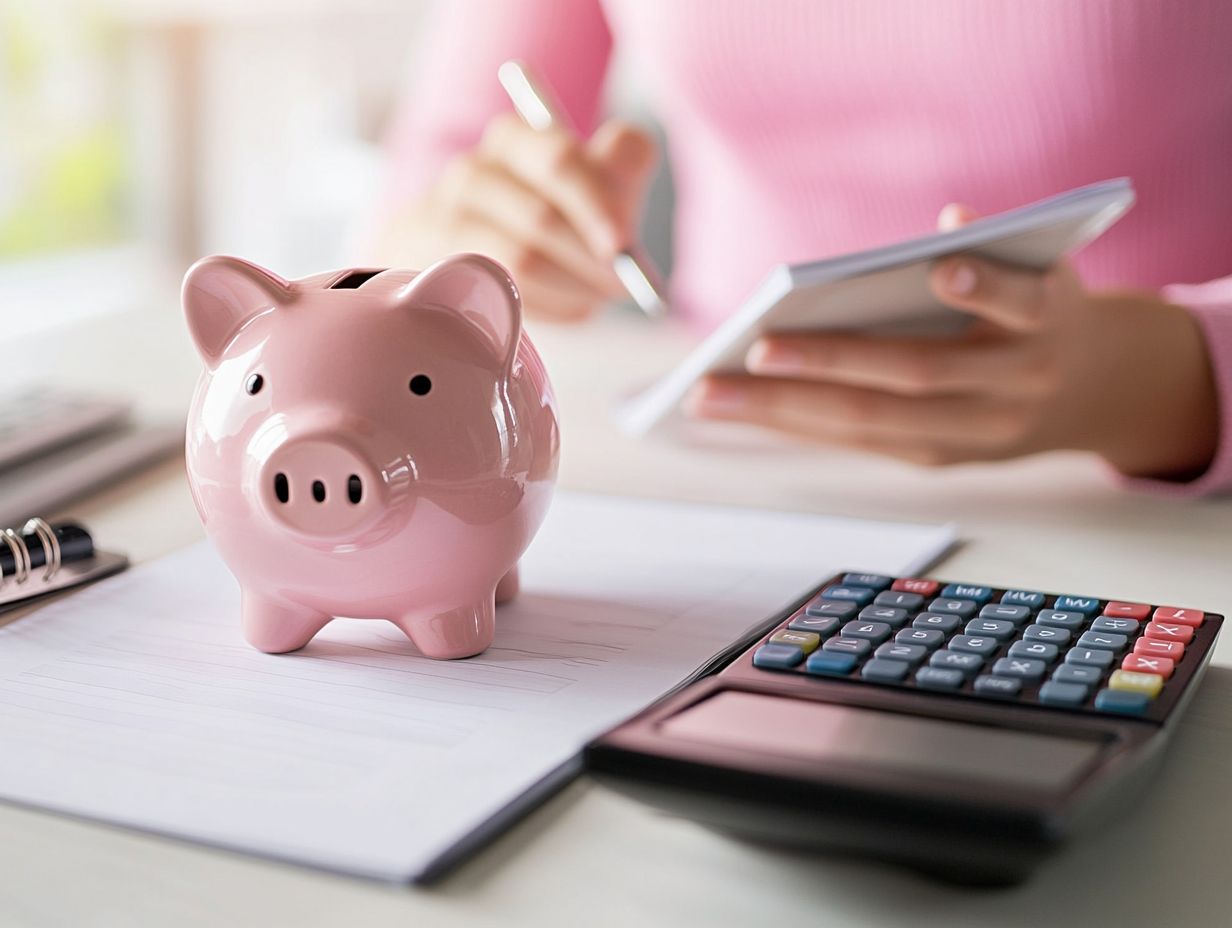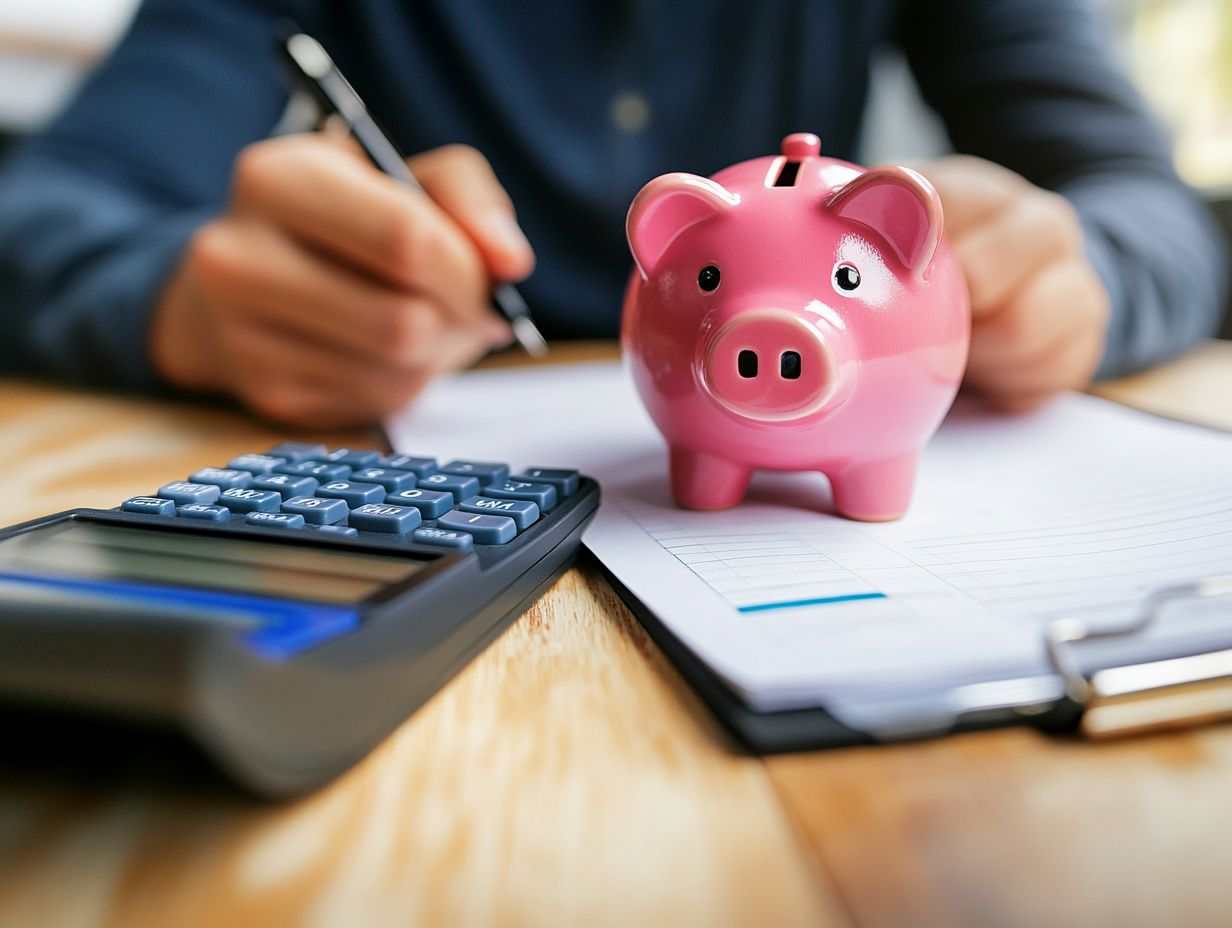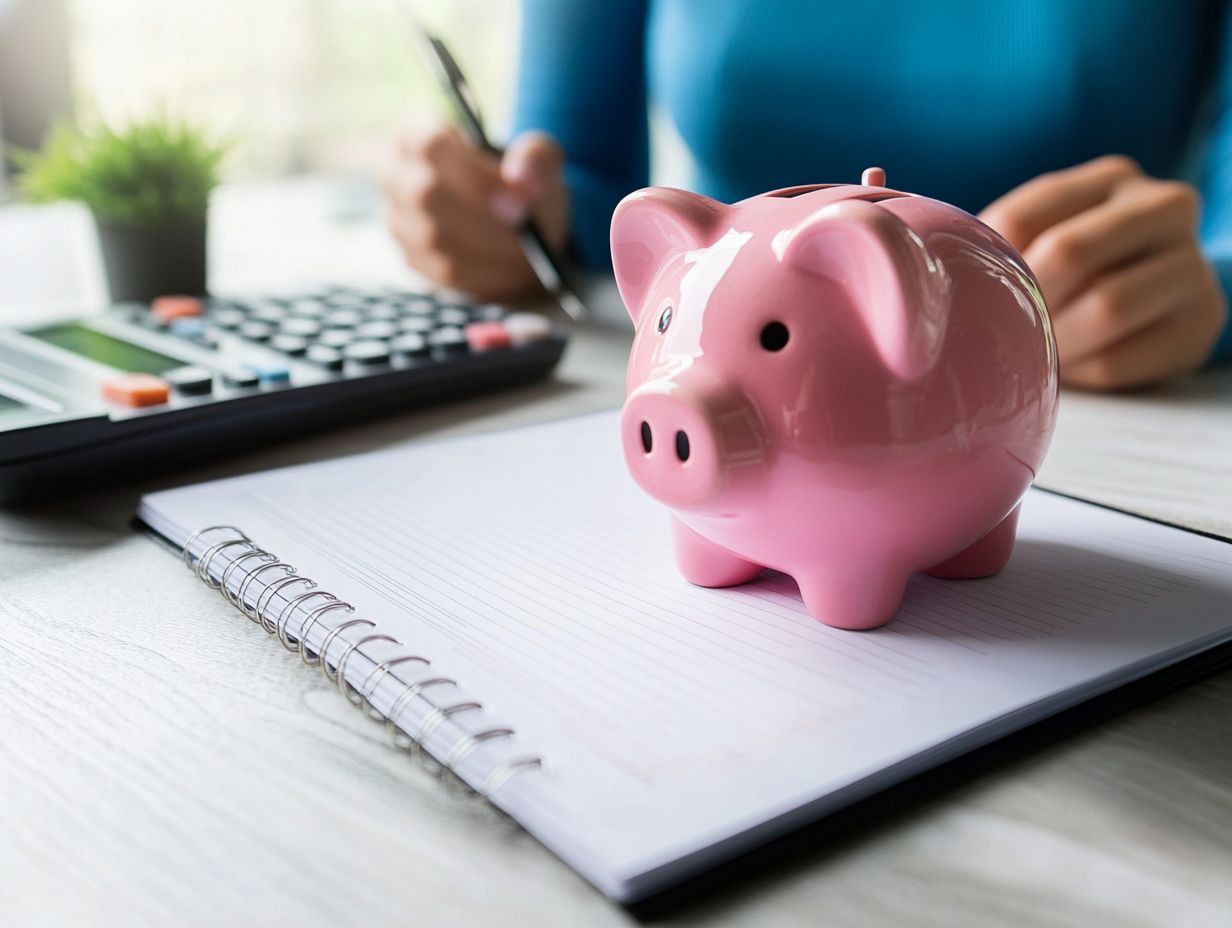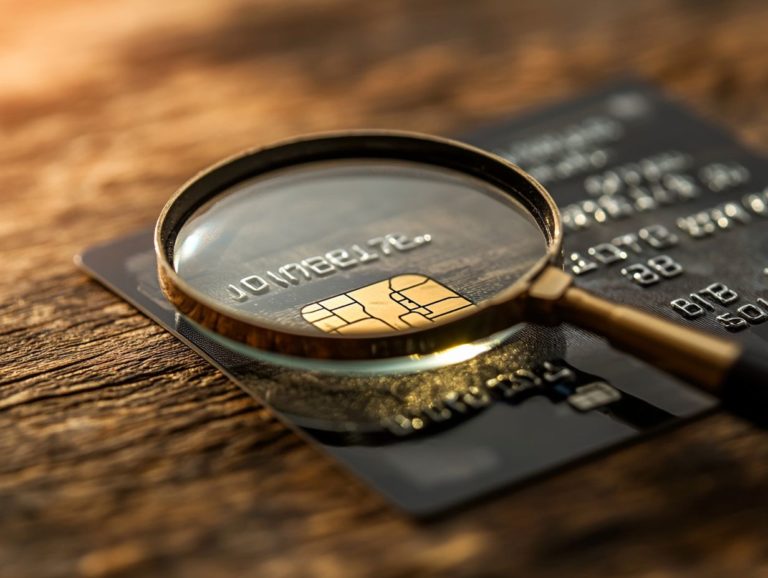How to Avoid Credit Card Debt
Credit card debt can be daunting. Grasping its complexities is your first step toward financial freedom.
This article explains credit card debt and why it can become a serious issue. It highlights the common pitfalls that often lead individuals into its grasp.
Discover powerful strategies that can help you avoid debt and take charge of your finances! You ll also find valuable insights on managing your current obligations.
Uncover long-term habits that can empower you to sustain a healthy financial life and evade the traps of the debt cycle.
Contents
Key Takeaways:

- Create a budget and track your expenses to avoid overspending and impulse purchases.
- Use credit cards responsibly and understand the high interest rates and fees associated with them.
- Develop long-term habits like saving and investing wisely while maintaining a healthy credit score to avoid credit card debt.
Understanding Credit Card Debt
Understanding credit card debt is vital for effectively managing your finances. To protect yourself, it’s also important to learn how to avoid credit card scams, as they can profoundly affect your credit score and financial aspirations.
This debt typically accumulates when you carry a balance from one month to the next. It often racking up high interest rates and payment terms that can quickly spiral out of control.
As your credit utilization rates rise, which is the amount of credit you’re using compared to your total credit limit, you may find yourself ensnared in a cycle of debt. This requires strategic approaches like the debt snowball or debt avalanche methods for resolution.
Credit card issuers can greatly influence your financial commitments, and the ramifications of automated payments can significantly shape your obligations.
What is Credit Card Debt?
Credit card debt represents the outstanding balance you owe to a credit card issuer after you’ve tapped into your available credit line. This financial obligation can escalate rapidly, primarily due to the interest rates that accumulate when you don’t pay off the full balance each month.
The allure of minimum payments often tempts you to delay settling your debts. This leads to a cycle where your liabilities continue to grow. Factors like late payments can severely impact not just the outstanding balance but also the interest rates applied, potentially driving them up significantly.
High credit utilization can worsen the situation, signaling increased risk to lenders and deepening your financial challenges.
Why it is a Problem
Credit card debt presents considerable challenges for you. It can obstruct your journey toward financial goals and adversely affect your credit score.
This situation can lead to a precarious financial landscape, where high debt levels result in soaring interest rates. This makes it increasingly tough to pay off balances.
When confronted with rising payments, you may find yourself trapped in a cycle of making only the minimum payments, which only extends the burden.
The stress and anxiety that often accompany this financial strain can take a toll on your mental and emotional well-being, impacting personal relationships and overall life satisfaction.
Over time, these issues can escalate into a larger crisis. Not only does your credit score take a hit, but your dreams of achieving significant milestones like buying a home or saving for retirement may begin to feel unattainable.
Common Causes of Credit Card Debt
Common causes of credit card debt frequently arise from lifestyle choices and financial mismanagement. Overspending and impulse purchases can easily spiral into an unmanageable financial predicament, leaving you to navigate the complexities of debt.
Start today by reviewing your finances, and take the first step toward a debt-free life!
Overspending and Impulse Purchases

Overspending and impulse purchases are primary reasons for accumulating credit card debt. These habits can lead to buying more than you can afford.
They often stem from emotional triggers like stress, anxiety, or the human urge for instant gratification. Society bombards you with ads promoting a lifestyle of excess, making it easy to buy things you don t need. Recognizing these patterns is the first crucial step toward breaking the cycle.
Keeping a spending journal can highlight emotional spending moments. Establishing a strict budget sets necessary boundaries. Learning to pause before a purchase and asking if the item is essential can curb impulse buying tendencies.
High Interest Rates and Fees
High interest rates and various fees tied to credit cards can dramatically inflate your total debt, making it challenging to pay off your balance.
When you carry a balance month after month, even a modest interest rate can snowball into a larger financial issue. For example, a card with a 15% interest rate on a $1,000 balance could cost you over $150 in interest in a year, turning manageable debt into a significant burden.
Various fees can also add to what you owe, including annual charges, late payment penalties, and foreign transaction fees. It’s essential to shop around for credit cards with lower rates and better terms to save money and secure your financial future.
Strategies for Avoiding Credit Card Debt
Implementing effective strategies to avoid credit card debt requires a proactive approach to budgeting and tracking your expenses. Learning how to avoid debt with business credit cards keeps you in control of your financial commitments and ensures a healthier financial future.
Budgeting and Tracking Expenses
Budgeting and tracking expenses are essential if you want to avoid credit card debt and learn how to avoid fees with rewards credit cards to meet your financial goals.
A systematic approach protects your financial health and provides insights into your spending habits. Using tools and apps like budgeting software, spreadsheets, or mobile apps can simplify this process. Aligning your spending with broader financial goals, whether saving for a dream vacation, buying a home, or preparing for retirement, is vital.
Establishing a savings plan by consistently setting aside a percentage of your income can enhance your financial stability and promote mindful spending.
Using Credit Cards Responsibly
Using credit cards responsibly is vital for managing credit and avoiding debt pitfalls.
Create a clear strategy to keep your balances low and pay off your charges in full each month. Understanding payment terms like interest rates and due dates helps you make informed decisions aligned with your financial goals.
Setting personal spending limits can prevent impulsive purchases, allowing credit cards to be a helpful tool instead of a source of financial strain. Learning how to use a credit card responsibly fosters a healthier credit profile and significantly contributes to achieving your long-term financial aspirations.
Dealing with Existing Credit Card Debt

Managing existing credit card debt requires a solid strategy. Consider creating a detailed repayment plan or exploring options like tips for managing credit card payments, debt consolidation, or personal loans to handle your outstanding balances.
Being proactive can make a significant difference in regaining control of your finances!
Start your journey to financial freedom today!
Creating a Repayment Plan
Creating a repayment plan is an essential step for you if you’re looking to systematically reduce your credit card debt and achieve your financial goals.
By establishing a clear roadmap, you can effectively manage your financial obligations and minimize that overwhelming feeling that often accompanies debt.
Your first task is to prioritize your debts. Focus on interest rates or balances to determine the best repayment strategy.
Next, calculate how much you can allocate each month. This will provide a realistic framework for tracking your progress.
Try popular methods like the debt snowball for quick wins or the debt avalanche where you focus on high-interest debts to save money in the long run. Both offer strategic paths to financial freedom.
Regularly tracking your payments not only fosters accountability but also boosts your motivation as you gain visibility into your progress.
Consolidating or Negotiating Debt
Consolidating or negotiating your debt can provide much-needed relief if you’re grappling with high credit card balances. By simplifying your payments and potentially lowering interest rates, this approach can be a game changer.
This process often involves securing a single loan to pay off multiple debts or talking directly with your creditors to lower the total amounts you owe. Many find that by consolidating their payments into one manageable sum, they not only alleviate stress but also save money on interest charges over time.
It’s essential for you to look closely at your finances and consider these options, particularly when facing overwhelming monthly payments. Negotiating with credit card issuers can further enhance these benefits, as many are willing to adjust interest rates, especially for loyal customers like you.
Keep in mind that while these strategies can improve your cash flow, they might temporarily impact your credit score. Therefore, careful planning and consideration are crucial for achieving long-term financial health.
Long-Term Habits for Avoiding Credit Card Debt
Embracing long-term habits to avoid credit card debt is essential for securing your financial stability and can be supported by learning how to manage credit card debt to help you reach your personal financial goals over time.
By cultivating these practices, you pave the way for a more secure and prosperous future.
Saving and Investing Wisely
Saving and investing wisely are essential practices that pave the way for financial security and help you steer clear of credit card debt.
By creating a structured approach to your finances, you can safeguard your immediate needs while simultaneously laying a strong foundation for the future.
Establishing an emergency fund is a crucial first step, ensuring that unexpected expenses don t throw you into financial turmoil.
Also, monitor your credit utilization, which is the ratio of your current credit card balances to your credit limits; ideally, this should remain below 30% to avoid raising any red flags.
Moreover, exploring a variety of investment options such as stocks, bonds, or mutual funds opens the door to potential wealth growth over time. These strategies not only minimize your risk of falling into debt but also enable you to pursue your long-term financial aspirations with confidence.
Maintaining a Healthy Credit Score

Maintaining a healthy credit score is essential for your future financial endeavors and can significantly influence your ability to manage credit card debt effectively. A solid credit score not only grants you access to more favorable interest rates on loans and credit cards but also serves as a testament to your responsible financial behavior. Several key factors contribute to achieving this coveted score.
Your payment history is paramount consistently paying your bills on time showcases your reliability.
To further bolster your score, consider keeping older credit accounts open, as this helps establish a longer credit history. Regularly reviewing your credit reports for inaccuracies and addressing them promptly can also enhance your overall credit health.
Frequently Asked Questions
What is the best way to avoid credit card debt?
The best way to avoid credit card debt is to spend only what you can pay back each month. Creating a budget and sticking to it is crucial. Use your credit card only for necessary expenses.
Should I have multiple credit cards to avoid debt?
No. Having multiple credit cards can increase your chances of falling into debt. Stick to one or two cards with low interest rates and manageable credit limits.
What are some common causes of credit card debt?
Common causes of credit card debt include:
- Overspending
- Using credit cards for everyday expenses
- Not tracking purchases and balances
Is it important to pay credit card bills on time?
Yes! Paying your credit card bills on time is crucial for avoiding debt. Late payments can lead to additional fees and interest charges, making it difficult to pay off your balance.
How can I use my credit card responsibly?
To use your credit card responsibly:
- Only spend what you can pay back
- Regularly check your balance and credit limit
- Make payments on time
- Review statements for errors or fraud
Are you struggling with credit card debt?
Take action now to regain control of your finances! If you’re struggling, address the issue as soon as possible. Contact a financial advisor or credit counselor today to create a plan to pay off your debt and avoid credit score pitfalls in the future.






